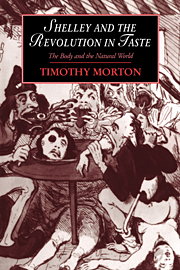Book contents
- Frontmatter
- Contents
- List of figures
- Acknowledgements
- List of abbreviations and a note on the text
- Introduction: prescriptions
- 1 The rights of brutes
- 2 The purer nutriment: diet and Shelley's biographies
- 3 In the face: the poetics of the natural diet
- 4 Apollo in the jungle: healthy morals and the body beautiful
- 5 Intemperate figures: re-fining culture
- 6 Sustaining natures: Shelley and ecocriticism
- Notes
- Bibliography
- Index
- Title in the series
6 - Sustaining natures: Shelley and ecocriticism
Published online by Cambridge University Press: 31 October 2009
- Frontmatter
- Contents
- List of figures
- Acknowledgements
- List of abbreviations and a note on the text
- Introduction: prescriptions
- 1 The rights of brutes
- 2 The purer nutriment: diet and Shelley's biographies
- 3 In the face: the poetics of the natural diet
- 4 Apollo in the jungle: healthy morals and the body beautiful
- 5 Intemperate figures: re-fining culture
- 6 Sustaining natures: Shelley and ecocriticism
- Notes
- Bibliography
- Index
- Title in the series
Summary
Malthus is a very clever man, & the world would be a great gainer if it would seriously take his lessons into consideration – if it were capable of attending seriously to any thing but mischief – but what on earth does he mean by some of his inferences!
(Shelley, L II.43)The rich grind the poor into abjectness & then complain that they are abject. – They goad them to famine and hang them if they steal a loaf.
(L I.271)INTRODUCTION
Of all the words discussed in this book, ‘nature’ is the most fraught with conflict, and it is obviously in the field of definitions of nature that ecology is contested. This chapter closes the book and opens out further ways of articulating the body, the city and capitalism through food. It accounts for developments in ecological writing, including the new prose on ‘Romantic ecology’. If the Shelleys and their circle speak to us of waste and flow, populations and poison, the dangers and benefits of capitalism, the corruptions of a certain kind of ‘materialism’ and the reform which will green the desert and sustain life for all, then may they be considered to be speaking ecologically, and with what sort of dialect?
The first section discusses the discourse of famine in Shelley's debate with Malthus. Since the contemporary arguments about famine and population are so vigorous, it seems an apt beginning. To focus on famine may help to ground further discussions of ecology in the ‘politics of the body’.
- Type
- Chapter
- Information
- Shelley and the Revolution in TasteThe Body and the Natural World, pp. 207 - 240Publisher: Cambridge University PressPrint publication year: 1995



